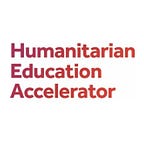Community Voice: Q&A with students at Kepler Kiziba
Kepler Kiziba is a blended learning university programme at Kiziba Refugee Camp in western Rwanda. The programme is a partnership between Kepler and Southern New Hampshire University, and pairs online learning with in-person seminars and specialized support. It allows refugee students the opportunity to earn U.S.-accredited Bachelor degrees and gain work experience while in a refugee camp. Kepler Kiziba was selected for the HEA’s First Cohort in 2016.
Abel
Abel is a 2015 cohort student at Kepler Kiziba. He is also a Kepler work-study student, gaining work experience whilst he studies that will help him find a job after graduation. Abel works as an English teacher, teaching English to other refugees in Kiziba camp.
What inspired you to join Kepler?
I liked the fact that Kepler provides students with a US degree without one having to go to America. Also, I heard that Kepler students perform well — that they speak English very well and that employers appreciate their skills. Kepler is really good. I enjoy studying technology and professional competencies.
How has attending Kepler changed you?
Well, before I couldn’t even start up a computer! Now I can type pretty fast, and navigate different software. Also, I couldn’t speak any English before, but now I can speak clearly in English.
Attending Kepler has also made me more optimistic. I have hopes for achieving a lot of big things in the future. I hope I will get a good job after getting a US degree through the Kepler programme. And I will be able to improve my family’s living standard.
On a less positive side, I’ve become too busy! I don’t get enough time to hang out with my friends, and I’m losing some relationships.
Any challenges?
We have insufficient power [in our classroom]. We use a solar-powered system, which does not work during rainy seasons. So, in the rainy season, I can’t power my laptop easily. After two hours, the battery system starts off an alarm that it’s getting overloaded. Also it’s hard to study in the Kepler classroom sometimes because there is a lot of noise from the secondary school students.
What are your goals?
To finish the Kepler programme in order to get a US degree. Then I will start my own business to make money. I will use the money to improve my family’s standard of living.
Tell us a bit about your background
There are nine of us at home, my parents and seven children. We arrived in Kiziba refugee camp in 1996, when I was two. We’re from the Democratic Republic of the Congo, from a town called Masisi. I’ve been living in the camp all this time.
Alicia
Alicia is a 2015 cohort student at Kepler Kiziba. She also holds a work-study position as a Computer Safety Manager for the Kepler classroom, allowing her to gain additional skills and work experience while she is studying. Alicia maintains and secures the laptops for all Kepler students, and also manages the solar energy power for the classroom.
What inspired you to join Kepler?
Kepler helps refugees to continue their university studies, and it does not charge refugees. Plus, it offers an international degree. I was inspired by the fact that with this degree I can work all over the world. The programme delivers many skills that are helpful in real life.
How has attending Kepler changed you?
Before attending Kepler, I could not use a laptop, but I feel like I am becoming an expert these days!
Also, before, I could not speak confidently in front of many people, but now I am an effective public speaker. I’ve gained other skills too, like critical thinking, problem solving, communication, and time management.
Any challenges?
The Kepler classroom is inside of the existing secondary school in the camp. So studying in a school that is built inside another school is difficult because it means we don’t have enough resources or space for studying.
What are your goals?
I want to focus on my studies, so that I can find a good job after getting my degree. I will use the skills I’m gaining at Kepler to solve some of my community’s problems.
Tell us a bit about your background
My family arrived in the camp from the Democratic Republic of Congo in 1996. I was one-year-old at the time. I have four brothers and sisters. I went to primary school in the camp and then did my O-levels and A-levels. Secondary school was tough because my parents were unable to provide me with basics such as clothes or hygiene products.
Blog originally written and posted by Nina Weaver, on the Humanitarian Education Accelerator microsite.
